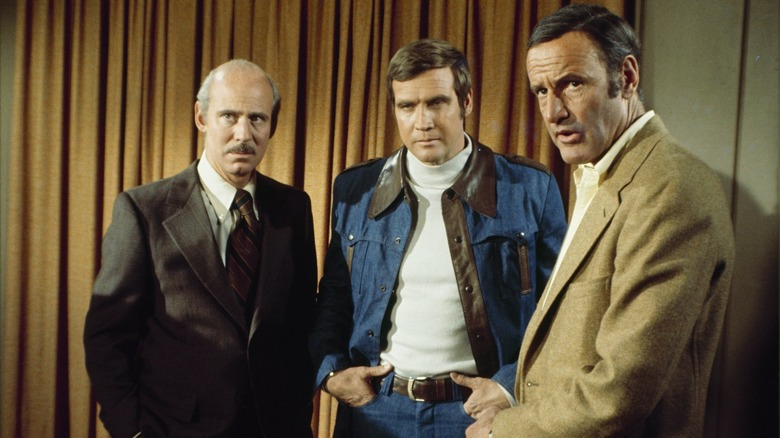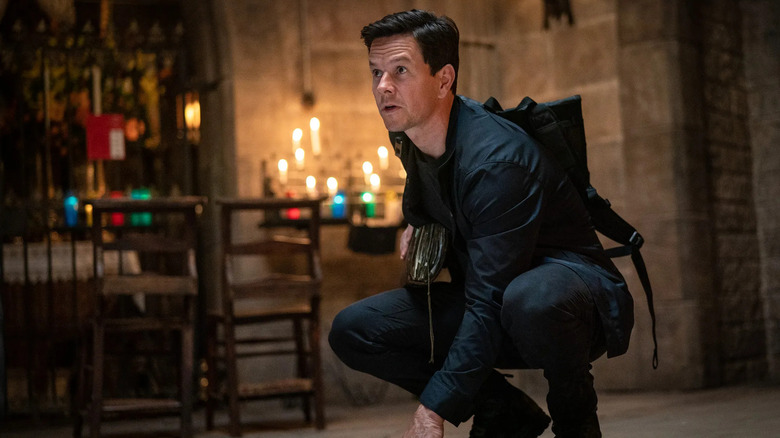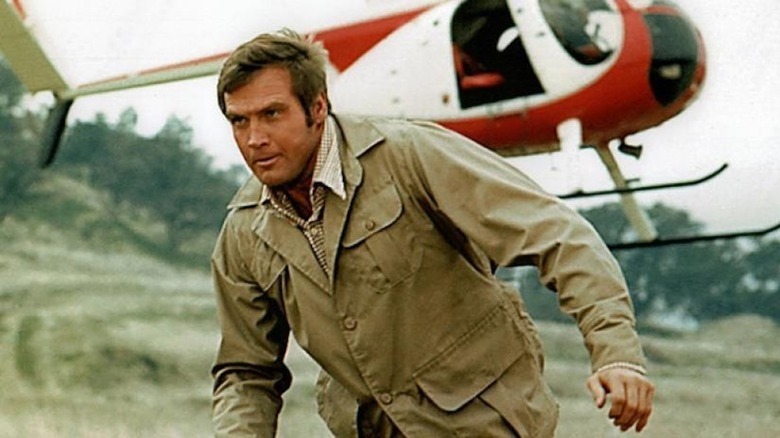Why We'll Probably Never See Mark Wahlberg's Six Million Dollar Man Reboot
This is going to stun anyone who grew up on 21st century superhero cinema (which kicked off in 2000 with Bryan Singer's "X-Men" and only now seems to be on the wane), but what if I told you that in the 1970s, there were television series dedicated to the Hulk, Wonder Woman, and Spider-Man, and they weren't the main small-screen pop cultural obsessions for sci-fi/fantasy fans? Not even close.
This is because every kid in America was crazy about "The Six Million Dollar Man."
Based on the novel "Cyborg" by Martin Caidin, "The Six Million Dollar Man" starred Lee Majors as astronaut Steve Austin, who's saved from certain death after the crash of an experimental aircraft when he is transformed into an experimental superhuman being via bionic implants. As the show's opening credits reminded us every week, these scientists made Majors "bigger, stronger, faster." He was as powerful as a bulldozer, fast as a sports car and possessed a bionic eye that granted him superior vision.
I was very little when the series originally ran on ABC, but thanks to my older brother I knew there was something different about "The Six Million Dollar Man." The special effects come off as awfully corny today, but the slow-motion imagery and that nah-nah-nah-nah-nah sound that accompanied Austin's remarkable physical feats was the coolest thing in the world back then. Throughout its five seasons, there wasn't a badder dude on network television than Steve Austin.
Considering that just about every other '70s television institution — e.g. "Charlie's Angels," "The Brady Bunch" and "Starsky and Hutch" — has spawned at least one big-screen revival, you're probably wondering why we've yet to see "The Six Million Dollar Man" movie.
According to some in Hollywood, it's Mark Wahlberg's fault.
The bionic wait
In a detailed history timed to the 50th anniversary of the series' premiere, The Wrap's Umberto Gonzalez spoke to numerous industry insiders who generally arrive at the same conclusion: the movie probably would've happened by now if not for Mark Wahlberg and his agent Ari Emanuel (the primary inspiration for Jeremy Piven's combative dealmaker Ari Gold on HBO's "Entourage"). But the as-yet-unmade film's development history predates their involvement.
In 1995, the year Betty Thomas' "The Brady Bunch Movie" became a surprise box office hit, Universal Pictures hired uber-geek Kevin Smith to pen a screenplay adaptation of "The Six Million Dollar Man." Nothing came of it initially, but years later Bob Weinstein's Dimension Films struck a deal with "Cyborg" author Martin Caidin's estate for the domestic rights (which required approval from international rights holder Universal). With the path cleared for a greenlight, Dimension tried to move forward on a comedic take directed by Todd Phillips and starring Jim Carrey (a la Phillips' disappointing "Starsky and Hutch" goof). This, fortunately, never came to pass.
Skip ahead to 2014, which is when Mark Wahlberg, who was a huge fan of the series as a kid, got himself attached to star as Austin. Argentinian director Damián Szifron, eager to hit Hollywood after the critical success of his "Wild Tales," was Weinstein's choice to helm the film, but the project could never get traction financially. In 2017, when the Dimension brand turned toxic due to Harvey Weinstein's myriad sexual assault charges, Bob Weinstein found a taker for "The Six Million Dollar Man" in then Warner Bros. head Toby Emmerich, but even with the well-regarded Travis Knight ("Bumblebee") signed to direct, the project continued to flounder in development hell.
There seemed to be sudden cause for hope last December when Wahlberg told Collider that David Ellison's Skydance Media was onboard to make the star's dream come true, but Gonzalez says "The Wrap can confirm" that there is no such deal at present.
The 6 million dollar question: why now?
This is why "The Six Million Dollar Man" has yet to happen in industry-speak. This being Hollywood, anything can change on a dime. The movie could be a go tomorrow. My question is this: why bother?
Nostalgia is a powerful drug, and, if properly administered, it's capable of producing the highest grossing movie in U.S. box office history (i.e. "Star Wars: Episode VII – The Force Awakens"). But who aside from couch potatoes under the age of, say, 45, is nostalgic for "The Six Million Dollar Man?"
Gonzalez's article allows a couple of sources to make the case that what would now surely be titled "The Six Billion Dollar Man" is more relevant than ever because, unlike in the 1970s, we do have the technology to potentially enhance human beings' physicality and motor functions (if you're dumb enough to let Elon Musk sink a chip in your gray matter). Here's the problem: I've seen this movie before. Many times over.
From Paul Verhoeven's "Robocop" to Leigh Whannell's "Upgrade," some of our finest filmmakers have worked thematically complex variations on "The Six Million Dollar Man." What makes this property special when we've been inundated over the last 24 years with regular people getting turned into superpowered juggernauts? And is Wahlberg anywhere near as engaging as rugged old Lee Majors?
Gonzalez's piece is pretty hard on Wahlberg's screen presence, but I think he'd be fine in the role if the material is up to snuff. I just can't muster up any interest in "The Six Million Dollar Man" conceptually. It's nothing more than a fond childhood memory. And for the vast majority of its target audience, it isn't a memory at all.


